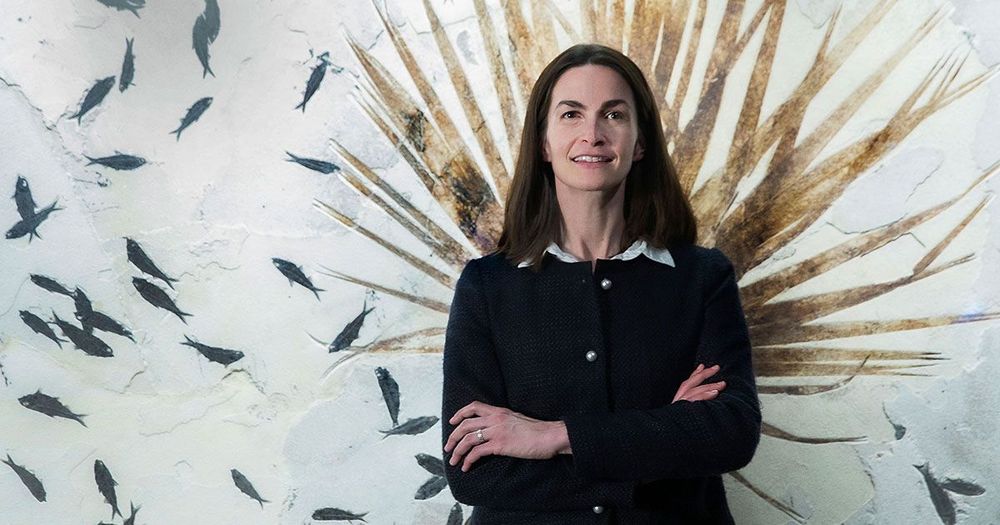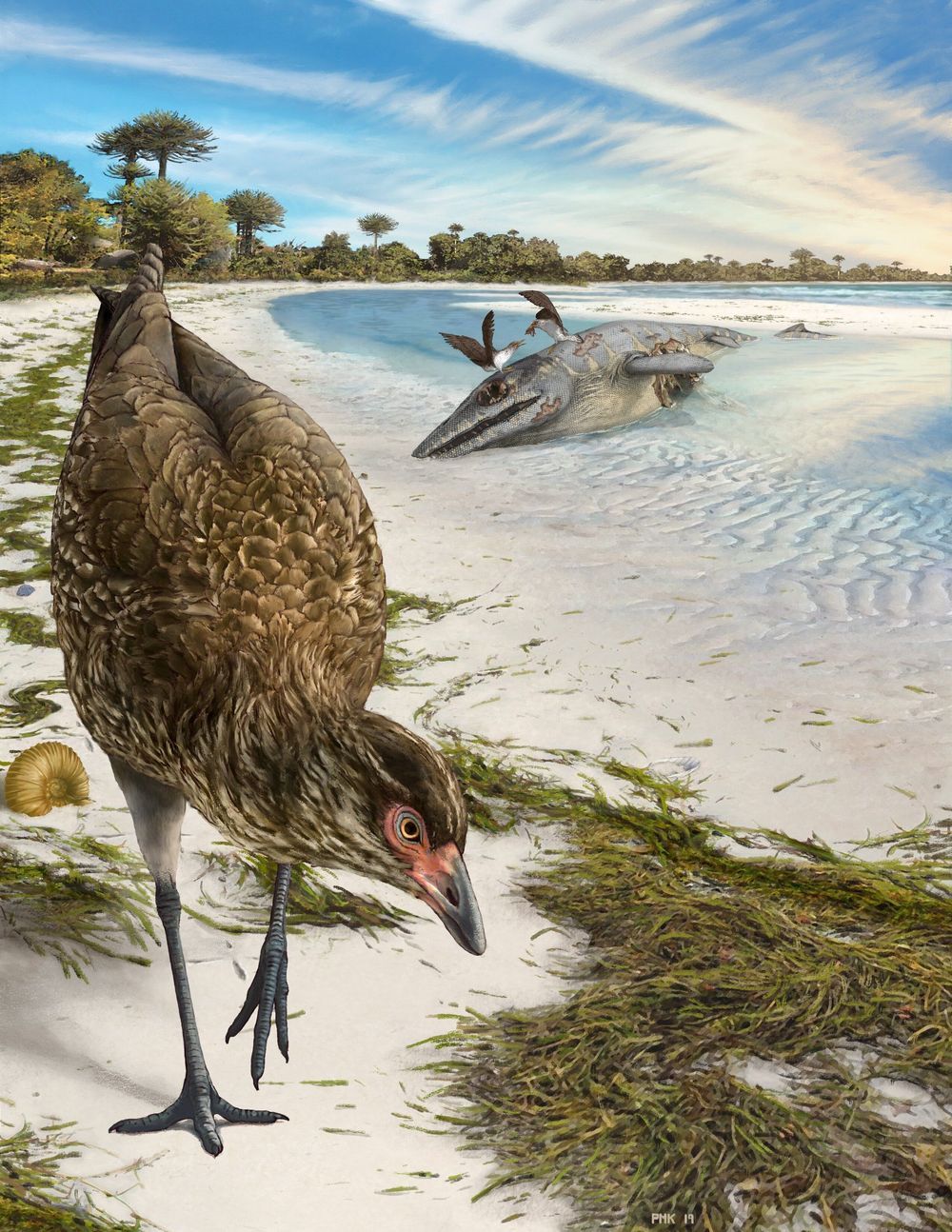O,.,o.
Latest in flurry of launches draws particular criticism amid coronavirus pandemic.



The oldest fossil of a modern bird yet found, dating from the age of dinosaurs, has been identified by an international team of palaeontologists.
The spectacular fossil, affectionately nicknamed the ‘Wonderchicken’, includes a nearly complete skull, hidden inside nondescript pieces of rock, and dates from less than one million years before the asteroid impact which eliminated all large dinosaurs.
Writing in the journal Nature, the team, led by the University of Cambridge, believe the new fossil helps clarify why birds survived the mass extinction event at the end of the Cretaceous period, while the giant dinosaurs did not.
Imagine the following scenario. You are a doctor working in a hospital in a very large and relatively polluted city, normally subject to a high level of seasonal respiratory ailments. Moreover, your healthcare system is stretched because of budget cuts and the devolution policies of central government. As a medical doctor you also know that flu viruses routinely mutate and may even be transferred from animals to humans. Exactly how all this happens varies from year to year – as does the exact mortality rate, though the pattern of infection and mortality is relatively well understood. In all these cases, the vast majority of people remain uninfected, asymptomatic or subject to mild symptoms that pass within a week. However, if the number of those requiring intensive hospital-based treatment rises above a certain percentage, the healthcare system can be quickly challenged. At that point, the doctor may panic, and armed with social media, he can now spread his concern around the world. But is the sheer appearance of a new virus strain the overriding cause?
The only part of this story that is really new is the availability of social media to spread news about any outbreak of such flu-like diseases. But one should not underestimate a general background awareness of overstretched public healthcare systems around the world, due partly to an ageing population but mainly due to the neoliberal policy horizon. Actions like the initial Chinese response to suppress the ‘whistleblower’ Li Wenliang have happened at the start of previous outbreaks – but now whistleblowers can communicate directly with the world. It is easy to forget that various new strains of flu are routinely reported in the media each year, with greater or lesser morbidity than earlier ones. Governments around the world normally monitor the situation in their own way, which means that the real figures have probably always been much higher than officially stated – both who catches the flu and who dies from it. Much depends on the motivation of the national health authorities to test specifically for the flu’s presence. After all, flu typically operates as a ‘nudge’ to worsen existing health conditions, and those conditions may be the primary medical focus.
We clearly don’t know everything we need to know about COVID-19. But the same applied to all the previous flu epidemics, which humanity has so far managed to survive. What is different now is the level of scrutiny and accountability of the response, mostly due to the recent information technology revolution, especially social media. This very basic socio-technical point has made it easier for the World Health Organization to designate COVID-19 a pandemic. The WHO’s insistence on mass testing (even if it doesn’t catch those who have recovered) also fits the same logic. What is striking so far about the global response are the efforts that societies have taken to reorganize themselves in order to protect those who are perceived as most vulnerable. It is quite unprecedented, especially in a world that is so otherwise imbued with capitalist values.
In the end, COVID-19 is the first virus to go properly ‘viral’, starting with Li Wenliang. That start has anchored the subsequent response. In particular, it has triggered a chain reaction that has exposed the different cultures of risk management around the world, as well as the varying conditions of national health care systems. Think of it as Nature’s brute audit on humanity’s sustainability. Indeed, that may be the virus’ main direct legacy – which means that public health care is bound to improve all round in the long run. However, if the lockdown continues long enough, the virus may end up questioning the modus operandi of contemporary capitalism in a way that long-standing complaints about inequality have failed to do. I expect that the vast majority of the population will manage to cope reasonably well during our period of ‘species captivity’, while consuming significantly less of the planet’s resources – that is, assuming that the increasing energy demands of online activities don’t first cause a short-circuit!
Be calm, carry on and stay well – and see you on the other side!
This message was sent to my various students at the University of Warwick, the day after the UK stepped up its fight against COVID-19 to near ‘lockdown’ level. One course I’ve been teaching for the past couple of years at the undergraduate and Master’s level has been ‘The Sociology of End Times’. I’ll need to add a section on ‘pandemics’ next year…

This grim vision of a possible future comes from the latest studies about how nuclear war could alter world climate. They build on long-standing work about a ‘nuclear winter’ — severe global cooling that researchers predict would follow a major nuclear war, such as thousands of bombs flying between the United States and Russia. But much smaller nuclear conflicts, which are more likely to occur, could also have devastating effects around the world.
As geopolitical tensions rise in nuclear-armed states, scientists are modelling the global impact of nuclear war.

North Korea conducted its sixth nuclear test on 3 September 2017, stating it had tested a thermonuclear weapon (hydrogen bomb).[6].

40% of the world’s insect species are in decline, and scientists believe that a third are threatened with extinction. From pesticides to invasive species, there are various reasons, but any losses could have a major impact on our food systems.

We would like to thank the many people who provided comments to our last coronavirus update at https://www.facebook.com/groups/lifeboatfoundation/permalink/10158676889983455/.
You can comment on this update at https://www.facebook.com/groups/lifeboatfoundation/permalink/10158683233098455/.
Here’s a lot of new information:
WATCH THE CORONAVIRUS EVOLVE!
Hit play at https://nextstrain.org/ncov to watch the coronavirus evolve in near realtime. (The play button is on the geography part.)
CORONAVIRUS HAS EVOLVED INTO TWO MAJOR LINEAGES AND IT IS POSSIBLE TO BE INFECTED WITH BOTH, A NEW STUDY SHOWS
Read https://www.telegraph.co.uk/science/2020/03/04/coronavirus-h…cientists/ to learn how there are two main lineages of this virus and that the less dangerous version seems to be gaining on the more dangerous version.
Many of you know the sad news that theoretical physicist & mathematician Freeman Dyson has passed away, so in celebration of his life and achievements, Anders Sandberg (Future of Humanity Institute) discusses Freeman Dyson’s influence on himself and others — How might advanced alien civilizations develop (and indeed perhaps our own)?
We discuss strategies for harvesting energy — star engulfing Dyson Spheres or Swarms, black hole swallowing tungsten dyson super-swarms and other galactic megastructures, we also discuss Kardashev scale civilizations (Kardashev was another great mind who we lost recently), reversible computing, birthing ideal universes to live in, Meinong’s jungle, ‘eschatological engineering’, the aestivation hypothesis, and how all this may inform strategies for thinking about the Fermi Paradox and what this might suggest about the likelihood of our civilization avoiding oblivion. though Anders is more optimistic than some about our chances of survival…
Anders Sandberg (Future of Humanity Institute in Oxford) is a seminal transhumanist thinker from way back who has contributed a vast amount of mind blowing material to futurology & philosophy in general. https://en.wikipedia.org/wiki/Anders_Sandberg
Happy Future Day (march 1st) : http://future-day.org
Freeman Dyson: https://en.wikipedia.org/wiki/Freeman_Dyson
Dyson Sphere: https://en.wikipedia.org/wiki/Dyson_sphere
Aestivation Hypothesis: https://en.wikipedia.org/wiki/Aestivation_hypothesis
Reversible Computing: https://en.wikipedia.org/wiki/Reversible_computing
Kardashev Scales: https://en.wikipedia.org/wiki/Kardashev_scale
Nikolai Kardashev: https://en.wikipedia.org/wiki/Nikolai_Kardashev
Many thanks for watching!
Consider supporting SciFuture by: